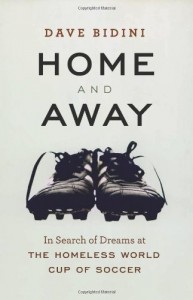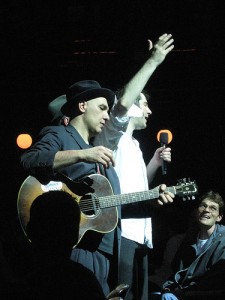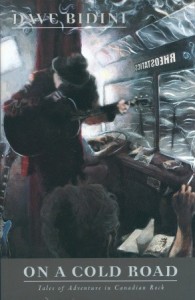“It’s part of the artist’s job: to see and sense things that other people are just too busy to notice.”
Author, columnist and songwriter/musician Dave Bidini‘s memoir On a Cold Road: Tales of Adventure in Canadian Rock (read an excerpt here) was recently chosen as one of five finalists for CBC’s Canada Reads: True Stories 2012 competition. The other contenders are Prisoner of Tehran by Marina Nemat, The Game by Ken Dryden, The Tiger by John Vaillant, and Something Fierce by Carmen Aguirre. Debates begin February 2012.
In Spring 2011, Dave was guest author for my course Memories into Story: Introduction to Life Writing, offered online through University of Toronto SCS in partnership with the New York Times Knowledge Network. Following is an edited version of my students’ interview with him, part of a collaborative assignment. Thank you to my Spring 2011 group for these intriguing questions.
What was your first published story? How did it make you feel?
DB: Oh, it felt great. It was the best thing, seeing my words in print. It was just a dumb concert review, but it was really important in terms of seeing what was possible. You know: you should send out ANYTHING to EVERYONE. We all get rejected, but you never know who will like what.
Your writing comes across as honest, sensitive and also entertaining. Do you think this is a result of natural talent or has there been a lot of hard work along the way?
DB: Well, I’m obviously very talented … Kidding. Before, I had enthusiasm, but only a little talent. You work, and it develops, def. But having the will to do it all the time is a good good start.
Did you aspire to be a writer early on or did the profession find you?
DB: At first I didn’t aspire. I just did. And then, around maybe 16/17, I aspired.
When you began writing, was it for yourself or for publication?
DB: Myself, ya. Just scribbling junk.
Do you trust your own instincts, or have other people you trust give you opinions on your writing?
DB: Both, I think.
How did you develop confidence in your writing?
DB: Encouragement from parents, editors, friends, subjects, all o’ that. And a kind of silly blind belief that what I’m doing isn’t useless.
How did you go about finding places/people to accept your first works? Were you rejected before you found success?
DB: My parents sent stuff out to high school papers and stuff for me. Rejection is always part of success, right to the bitter end, right down the line. You have to get used to both, acceptance and rejection, and one serves the other.
What do you do when you find yourself at a loss for words/inspiration (assuming this happens)?
DB: I force myself to crack the rocks. To FIND a way.
You have a so many things going on in your life. How do you manage to keep everything organized, particularly your writing?
DB: I kinda write all of the time unless I am utterly sick of it. Then I have a small break, and ultimately, am compelled to write again.
Do you write “for fun” as well as professionally?
DB: Well, it is often hard. But I wouldn’t do it if it wasn’t fun.
In “Travels in Narnia,” a moving memoir on loss and hope, you say that “the doors of perception” were opened to you as you travelled across Canada with the band. Did you have insight at the time, or was it a gradual process?
DB: After a while, in Calgary, I could sense that something was evolving. I wrote it in four hours in my friend’s apartment there. It had taken me three years to find the jam to sit down and do it, but when I wrote, it all spilled out pretty much how it sits on the page. I think, as an artist, you sort of have to know when those opportunities are upon you, and you force yourself to move forward through them, good or bad, or whatever. The artist has his head in the clouds with his feet planted into the earth.
 You must have had to do a certain amount of research for Home and Away, about homelessness in Toronto, for example. Do you research as you go along, filling in holes in the narrative as you notice them, or write the first draft while the idea is fresh, and research later?
You must have had to do a certain amount of research for Home and Away, about homelessness in Toronto, for example. Do you research as you go along, filling in holes in the narrative as you notice them, or write the first draft while the idea is fresh, and research later?
DB: Good question. It varies from project to project. Sometimes, the story sits awhile, and you have to chase it. Other times, it’s right there and you’re compelled to write it immediately. I wrote H&A fast because I knew that Melbourne would only happen once and the players would only experience what they were experiencing once. So my late nights and early mornings were filled with A LOT of writing each day.
Your writing seems so effortless. Do you do a lot of rewriting before you feel satisfied with the piece?
DB: Ya, I rewrite a lot. Thank you.
As a visual artist, I notice many similarities between art and writing; art is art, no matter the medium. How did music — being in a band — help or hinder your writing?
DB: It was great. The time I spent writing was time away from the madness of rock and roll. It was a healthy solitary time for me. And it made the travel less difficult. I used to bring a portable typewriter on the road. I loved using it, writing at clubs, backstage, and on the bus.
Is it harder to get published now than when you first started?
DB: Way fucking harder, but easier too. Harder because big publishers are in a time of transition; easier because there are more good small presses.
I’ve felt for a long time that everything in the world is connected, somehow. I get the sense from your writing that you feel the same. Am I correct?
DB: Ya, it’s important to find those lines and colour them in. It’s part of the artist’s job: to see and sense things that other people are just too busy to notice.
Do you believe writing can be taught? Or is it something innate, a creative gift that not everyone has?
DB: If you love it, you can learn it. I know this is true with music — and I am NOT naturally gifted — so it must be true with other art.
What’s the worst rejection letter you ever received?
DB: A guy in NY told me to stop writing. I was 16 and had sent him a record review.
What’s the nicest rejection letter you ever received?
DB: I got lots of cool letters from sportswriters in the 1970s, encouraging me and stuff.
Which is your first love – music, sports or writing?
DB: Sports. Writing. Music. And sportswriting.
If you could have only three books on your bedside table for the rest of your life, what would they be?
DB:
Be True to Your School by Bob Greene
Jack in the Box by William Kotzwinkle
War on Ice by Scott Young
Everyone you talk to seems to think they have a book in them and yet most don’t get round to writing it. Do you have any thoughts on this? Advice?
DB: GET AROUND TO IT. I mean, you either HAVE to do it or you DON’T. Wanting to do it isn’t enough.
* * *
DAVE BIDINI is the author of nine books. His play The Five Hole Stories was performed by One Yellow Rabbit and toured Canada in winter, 2009, and his two hockumentaries, The Hockey Nomad and The Hockey Nomad Goes to Russia, were Gemini-nominated films (the former won for Best Documentary). He is the recipient of numerous National Magazine Awards as well as a weekly columnist in The National Post. In 1994, his then band, Rheostatics, won a Genie Award for “Claire” (from the film Whale Music) and two of their albums were included in the Top 20 Canadian Albums of All Time. His first hockey book, Tropic of Hockey, was named one of the Top 100 Canadian Books of All Time by McClelland & Stewart, and his baseball odyssey, Baseballissimo, is currently being made into a feature film. Dave teaches songwriting for U of T School of Continuing Studies.

